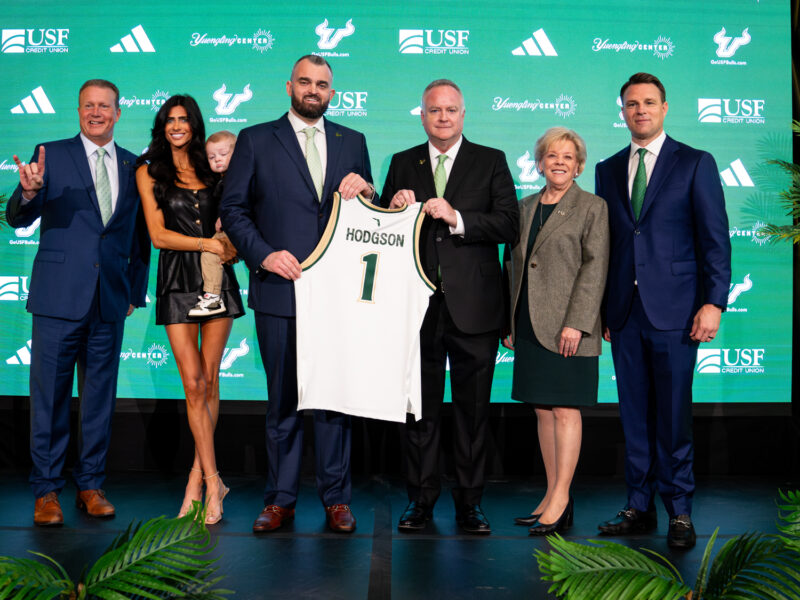
A sustainable campus is one that improves the environment by using clean and efficient energy sources, saving water, recycling, funding renewable energy projects, planting native plant species and educating the college community.
Net zero carbon footprint. That’s the ultimate goal for USF St. Petersburg.
On Earth Day 2013, along with 685 university leaders, USFSP pledged to achieve climate neutrality on campus by agreeing to the American College and University Presidents’ Climate Commitment (ACUPCC).
According to the ACUPCC website, these institutions have committed to three primary goals: (1) Create a plan to reach climate neutrality as soon as possible, (2) Implement two or more “tangible actions” to reduce greenhouse gases and, (3) Publicize the finalized action plan, along with a greenhouse gas inventory and progress report.
“Our campus has committed to one day becoming carbon neutral,” said David Vasquez, 22. “We will either sequester or offset as much carbon emissions as we can use on campus.”
Vasquez is heavily involved in many of the sustainable efforts at USFSP. He is the Secretary of Sustainable Initiatives, Chair of the Clean Energy and Resource Conservation Commission (CERCC), and Chair of the Student Green Energy Fund Committee (SGEFC).
The most recent Greenhouse Gas (GHG) Inventory was conducted in May by CERCC with support from consultants at the Center for Climate Strategies. After analyzing three categories of emissions, the report indicated the largest source of carbon came from electricity use and commuter vehicles.
Having identified the major sources, students and staff working to fulfill Commitment requirements are able to determine what has to be done.
As required, USFSP organized and proposed a Climate Action Plan (CAP). Vasquez said the CERCC will be carrying out the plan with more help from the Center for Climate Strategies, as well as key stakeholder representatives from Duke Energy, the city of St. Petersburg and USFSP students and staff.
“The CAP will identify strategies and timelines for our campus to become carbon neutral. Strategies include increasing energy efficiency, increasing our amount of recycling [and] installing more renewable energy on campus,” said Vasquez.” “The CAP will also include more sustainability curriculum in all majors, as well as creating more opportunities for students to learn about climate change through projects, internships and events to grow our culture as a sustainable campus.”
Although there is still plenty of work to be done to accomplish the ongoing sustainable goals of the CERCC, Vasquez said he is very excited about another project.
A new “Food Forest” garden will be behind Residence Hall One. The project is the brainchild of Student Government’s Department of Sustainable Initiatives and the Garden Club.
The garden was originally behind the Piano Man building, but had to be removed to allow for construction of the Kate Tiedemann College of Business.
“We used the window of opportunity to create something bigger and better than what we had,” said Vasquez.
The Food Forest will accomplish three goals: (1) Through permaculture design, it will attempt to mimic nature and use resources efficiently, (2) Demonstrate urban agriculture, which follows the idea that as more people flood to cities, residents will have to start growing their own food as opposed to getting it from elsewhere, (3) Challenge the issue of food deserts, which are typically impoverished areas with very limited fresh produce.
Just south of USFSP, there is a food desert where residents are likely to purchase low-quality produce from gas stations and mini-marts with little selection.
“We hope to provide an example solution to the city of St. Petersburg and [surrounding] neighborhoods, and show them they can have access to fresh fruits and vegetables by creating community gardens,” Vasquez said.
Because USFSP is a small campus, Vasquez said students have an even greater opportunity to become leaders and take action to address environmental issues they care about.
“I think it is up to our generation to stand up and take action in creating a just and sustainable society for all.”


